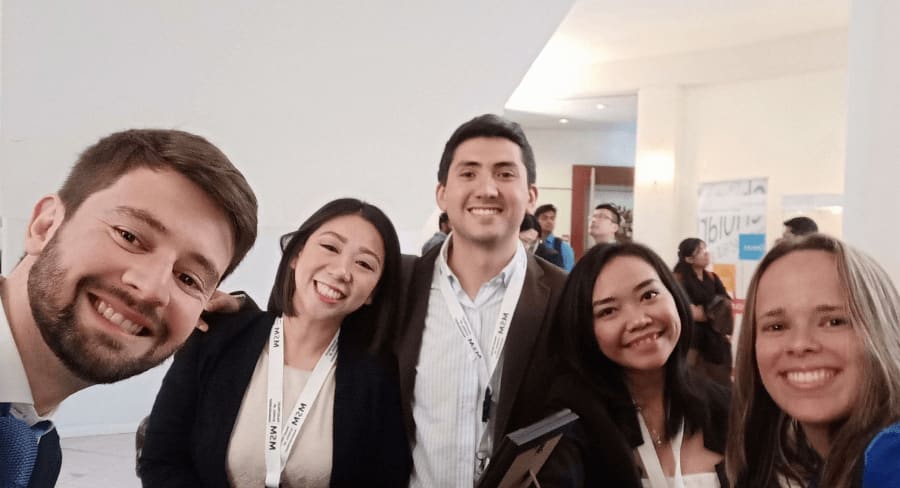Is College Worth It? The Pros and Cons of Getting a US College Degree
Have you been wondering “is a college degree worth it?”, or if it’s even the right path for you? Then this article is for you! We’ll go over the advantages of college education, as well as the potential challenges, such as tuition and academic rigor.
- Getting Started
- Bachelor's Degree
- Why Study Abroad?

Quick summary
- Bachelor's degree graduates in the U.S. earn around 40% more than high school graduates.
- Colleges are a great space for networking with experts across many fields.
- Colleges tend to me more expensive and more rigorous than high schools, which can be stressful.
Have you been wondering “is a college degree worth it?”, or if it’s even the right path for you? Then this article is for you!
We’ll go over the advantages of college education, as well as the potential challenges, such as tuition and the academic rigor.

What are the benefits of college?
The first step to answering the question of “Is college worth it?” is to analyze the benefits that come with a college degree in the United States.
You'll have more career growth opportunities
One of the main selling points of college education is that a college degree opens more and better career opportunities.
For example, college grads are more likely to earn a higher salary than workers without a degree. The U.S. Report on the Condition of Education 2022 for example, shows that the average annual earning for 25- to 34-year-olds in the US are $36,600 for high school graduates, compared to $59,600 for Bachelor’s graduate.
College graduates also, on average, have a higher employment rate and more job prospects than people without a degree. The same report highlights that the employment rate of 25- to 34-year-olds from the U.S. is 86% for students with a university degree (or higher) and 68% for high school graduates.
Want to decide what major is right for you?
Our free 5-minute quiz can help you find your dream major!
Personal growth and networking opportunities
A college career not only provides knowledge and skills learning but also affects the personal and social skills.
College friendships, study abroad exchanges, professor-student relationships, and the stress of exams are all life experiences that you will hardly forget and will be part of your cultural background.
The education journey will enable you to gain more self-confidence, set new goals for the future, and learn how to manage time efficiently. College also allows you to build a network of international friendships or business contacts that can come in handy later on.

An opportunity to study abroad
Experiences abroad are a great way to challenge yourself and experience life in a new country. You can choose to complete a full degree abroad or spend just a few semesters at a host university. Depending on which program you apply for, you will have different benefits.
One of the most popular exchange programs, Erasmus+, offers students a wide range of opportunities abroad in European and extra-European countries for up to 12 months. You may also get an Erasmus+ grant as a contribution to your travel and living costs.
Think also about the long-term benefits: living abroad comes with an opportunity to learn a new language, study with peers from all around the world, and experience a new culture.
What’s more, employers nowadays are looking for candidates from all walks of life. Studying abroad lets you make your CV stand out and shows that you’re ready to work hard and challenge yourself in a new environment.
However, if you're still on the fence about studying abroad, our free 3-minute "Should I study abroad?" quiz can help you decide!
As to where you can study abroad, there is no right or wrong choice. If you’re curious about our favorite study abroad destinations, check out our Top 10 Places in the World to Study Abroad list.
You'll develop your practical and academic skills
Do schools prepare students for the real world? Theoretical and practical knowledge are two sides of the same coin and are both essential.
Some universities and programs are more practice-focused. For example, Design and Engineering programs develop students' technical skills and hands-on experience. At the end of their Bachelor’s degree, students are often asked to complete a big project and submit an impressive portfolio of work.
Academic skills such as research, report writing and oral presentations, communication, and critical thinking are however the basis for many practical jobs. There are many “theory-based” majors that teach you transferrable skills for many different jobs. For example, psychology programs equip students with knowledge and skills they can use in many fields, from therapy to user experience to human resource management.

The challenges college students face
Colleges in the US can be expensive
Getting a college degree can be expensive in the United States. Here are some examples of costs you can expect to deal with during your college years:
- Tuition fees: include money to be paid to the university for education
Administrative costs: include payments for application, visa, and insurance fees for international students - Accommodation: includes the cost of your bedroom/apartment on Campus or off Campus. The amount depends on bedroom size, availability of rooms, cost of living, and position.
- Living and travel costs: includes money for transportation to/from airports, bus tickets, cost of food, and main daily expenses
Keep in mind that your country of choice will determine the general tuition structure, as well as the cost of living. You can check out our Country Guides for an overview of the study abroad expenses around the world.
College demands more of your time than high school
Is college harder than high school? Yes, in most cases. The academic rigor of college courses can be significantly more demanding than high school, requiring a deep dedication to studies and a passion for the chosen field.
Developing good study habits and honing time management skills can be instrumental in overcoming these hurdles. We've created a free guide covering practical tips on how to improve your time management skills.
Some people have trouble adapting socially
Going to college often means stepping into a diverse and multifaceted social environment. For many, this transition can be tough.
Most of us never learned how to build friendships from nothing - as we've simply gotten closer to our fellow classmates and neighbors due to the pure proximity factor. What's more, making friends as an adult is much different from making childhood friendships, as adults already formed daily habits and their personalities to an extent.
The good news is that most people feel this way at college, so lots of people are going to be in the exact situation that you'd be in as well - trying to navigate those first few stages of forming a friendship and asking to hang out often.
Uncertain career outcomes
Not all college majors provide a safe, certain and one-way-trip path to a job after the graduation. It's a good idea to actively engage in internships, research projects, and networking events to enhance their employability and forge connections in their respective fields.
Some students realize that they don't actually want to work in the field they got their degree in, and it might be harder to find a job in their new area of interest. If this sounds like you - don't despair. You're not nearly the first, nor the last one, in this situation. Countless people changed majors halfway through, or simply completed a new degree in a different field. It's just important that you continuously reflect on your strengths, interests and passions in order to find a job you'll love.

Alternatives to college education
If studying for a college degree for 3 years (or more) is not the right choice for you right now, there are plenty of other opportunities out there:
- Specialization courses: many institutions offer one-year courses in specific fields, such as cosmetology, design, or IT.
- Internships and apprenticeships: you can also seek an apprenticeship in your home country or abroad. For example, here’s the official U.K. government list of apprenticeships you can pursue in different fields. These include on-the-job training and taught lessons at a college or a training institution for up to 20 percent of their working hours.
- Online training courses: the benefits of this type of education certainly include saving time and fuel. Although some courses are quite expensive, they are innovative and open up many digital opportunities.
- Online learning platforms: this option is a smart alternative for people needing additional flexibility. Lessons are often recorded, and materials are uploaded to an online learning platform, so you can access them at any time.
Need help applying to American colleges?
We've gathered a list of all the documents you need to apply to American colleges, along with valuable tips on how to make your application stand out in the sea of other qualified candidates.
Simply fill out the form below to access the handbook.

Sara Evans
Author
Sara is the Content Designer at Keystone Academic Solutions, in charge of creating and curating content for students across the globe. Due to her background in UX and teaching, she's always in pursuit of new ways of presenting information more clearly.
Read related articles

These Exams Could Help Make Your Study Abroad Dream a Reality

10 Reasons to Be a Camp Counselor in the US or Canada
